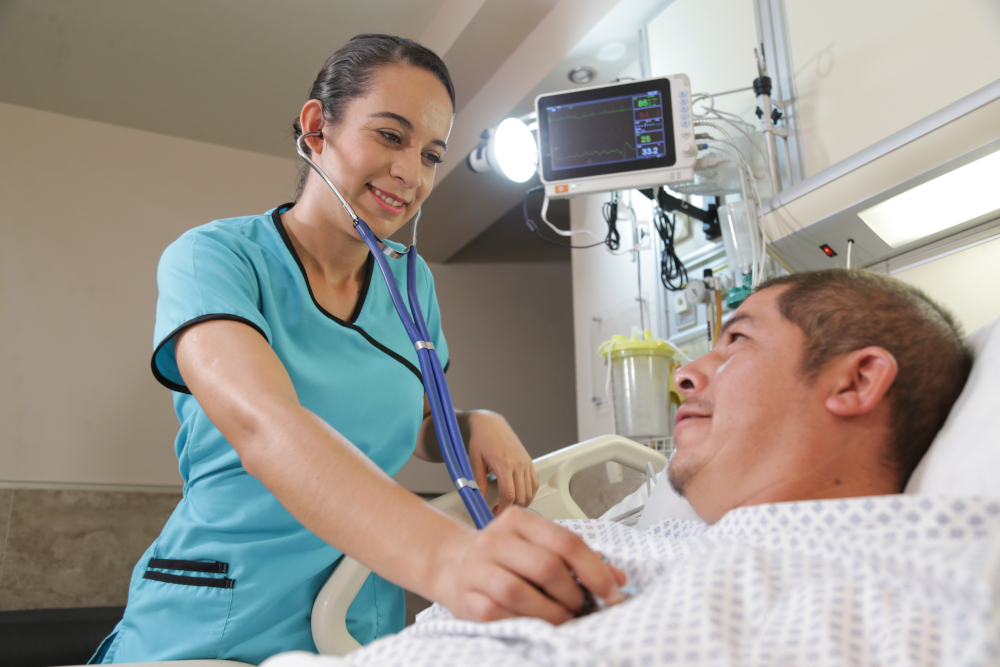5 Reasons to consider a second-degree nursing program

Some people graduate from high school, take themselves off to college, get a bachelor’s degree and begin working in a field that they later find doesn’t really fulfill them. If that sounds like you, and you want to pursue a career in a field that is challenging and rewarding, there is no better career path than nursing. But what is the best way to prepare for a career as a registered nurse (RN)? Choosing a second degree nursing program is a great way to transition into a nursing career.
There are many reasons to choose nursing as a second career. One primary motivator shared by RNs is the ability to help people, which provides a great sense of fulfillment. Let’s look at some of the practical reasons for making the transition to a career in nursing.
1. Bachelor’s-prepared nurses are becoming the preferred standard
RNs with bachelor’s degrees are better prepared to serve patient needs. Online Accelerated BSN programs are designed to make students better nurses through comprehensive education in evidence-based clinical care and leadership. Coursework on community health and on how to manage different patient populations ultimately translates to better patient outcomes.
The American Association of Colleges of Nursing (AACN) has cited several studies showing that patients cared for by nurses with bachelor’s degrees had lower in-hospital mortality rates and enjoyed a “substantial survival advantage.” In addition, B.S.N-educated nurses were rated as “significantly better prepared than associate degree nurses on 12 out of 16 areas,” including quality and patient safety.
Some states have already joined the trend to require a BSN for RN licensure. Many employers also prefer bachelor’s-prepared nurses, granting them higher average salaries. A nurse with a bachelor’s degree is also better situated to advance to other positions within the health care system.

2. Nursing offers security and a good salary
For several years, experts on the health care workforce have been concerned that the United States is facing a nursing shortage. Some of the shortage is due to the increasing population of older Americans who tend to have more chronic or severe health problems, and therefore require more nursing support. Another factor in the nursing shortage is due to the fact that many nurses are approaching retirement age themselves. As they leave their positions, newer nurses will be needed to take up their duties.
Because of these factors, the U.S. Bureau of Labor Statistics has forecast job growth for registered nurses to be at 9 percent for the period between 2020 and 2030. They estimate that nationally there will be nearly 195,000 positions open for RNs each year during those 10 years.
In addition to the high number of available positions, RNs can claim very competitive salaries. The BLS has determined the national mean annual salary for RNs to be $80,010. Individual salaries are, of course, dependent on experience, setting, and geographic location but overall, nurses are well compensated when compared to the national average salary of $56,310 for all occupations.
3. Nurses enjoy different workplace options
The majority of nurses work in a clinical setting. Hands-on nursing can take place in a variety of places, including:
- Hospitals
- Clinics and physician offices
- Home health care and virtual care
- Military bases
- Outpatient care centers (such as dialysis, infusion, or ambulatory surgery centers)
- Schools and community centers
- Skilled nursing or residential care facilities
There is also a special group of nurses, called travel nurses, who go where they are needed for assignments lasting several weeks or months. This can be a great opportunity for nurses who want to work and explore different areas of their region or the country.
There are also roles for registered nurses in work beyond the bedside. RNs can be nurse navigators, administrators, informatics specialists and more. The range of work that nurses do is very wide.
4. Career growth is virtually unlimited
Whether a nurse chooses to spend their career in clinical work, or in a leadership or administrative role, there are additional certifications or degrees that can powerfully propel their career in advanced nursing specialties and practice. Graduates of master of science in nursing (MSN) programs may elect to stay in an RN role or become a family nurse practitioner (FNP).
Some nurses also pursue degrees that prepare them to become a doctor of nursing practice (DNP), a designation that can be earned either with or without achieving a master’s beforehand. DNPs, for the most part, focus on clinical work, frequently in the role of nurse practitioner.
Nurses who want to focus on research often choose to earn a PhD in nursing. This can prepare them for academic roles, or lead them into designing and conducting research to improve nursing practice, among other pursuits.
5. An ABSN program prepares you for a career switch
Many people who want to make a switch to a career in nursing choose an Accelerated Bachelor of Science in Nursing (ABSN), an online nursing program offered by nursing schools specifically for people who already have a bachelor’s degree in another field of study. The program is called “accelerated” because it is focused on nursing science and does not include the general education requirements that students completed in their first bachelor’s program. Because of this, students can complete this accelerated degree program in as little as 16 months.
How an online nursing program works
An important benefit of enrolling in an online second-degree nursing program is the ability to conduct most of the coursework from one’s own home (or library or coffee shop). Online courses in the science of nursing range over a number of topics and include regular interaction with faculty and student peers. All work is done online except for clinicals and skills residency.
At Marymount University Online, students will be required to complete one skills residency called the clinical skills visit. During a two-week visit on-campus, students will complete laboratory hours and engage in hands-on learning experiences, skills training and practice in a simulation lab. This visit also makes students eligible to start clinical hours, where they will complete shifts in a local facility within the state of Virginia. Clinical hours will start roughly week 10 of the program and continue until graduation.
Your Nursing Career Begins with Marymount Online
When looking for a well-regarded accelerated bachelor of science in nursing program, it is important to find one that balances academic rigor with enough student support to foster success. At Marymount University Online, students can complete their nursing education in about 16 months, which can get them into their new career field more quickly.

The program is designed specifically for the DC metro area residents and requires a full-time commitment. Students generally spend 10–12 hours per day on coursework. Our Clinical Placement team coordinates all aspects of the clinical placement process, with the goal of securing you a placement site and preceptor within a reasonable distance of your home—allowing students to concentrate more on their learning and less on logistics.
The program curriculum will explore the following themes:
- Introduction to Nursing: Build foundational knowledge in nursing science, theory, and evidence-informed practice
- Clinical Care: Care for patients across the lifespan with acute and chronic illnesses
- Community-Specific Health: Explore cultural and social determinants that influence the health of patients and their families
- Research Methods and Applications: Evaluate evidence and apply research methodologies to investigate nursing-related issues
- Clinical Reasoning: Build your critical thinking skills to make clinical care decisions
- Leadership: Understand issues, trends, and change strategies across nursing and health care to effectively lead in various settings
In addition, the Washington, D.C.-based university has a great reputation—it has been ranked as a Best Regional University—South, and Best Value School—South by U.S. News & World Report; and a Veteran-Friendly Yellow Ribbon School by the Department of Veterans Affairs. Most importantly, all of Marymount’s online classes are accredited by the CCNE (Commission on Collegiate Nursing Education).
Marymount allows you to fast-track your path to becoming an RN. Contact us to learn more.
